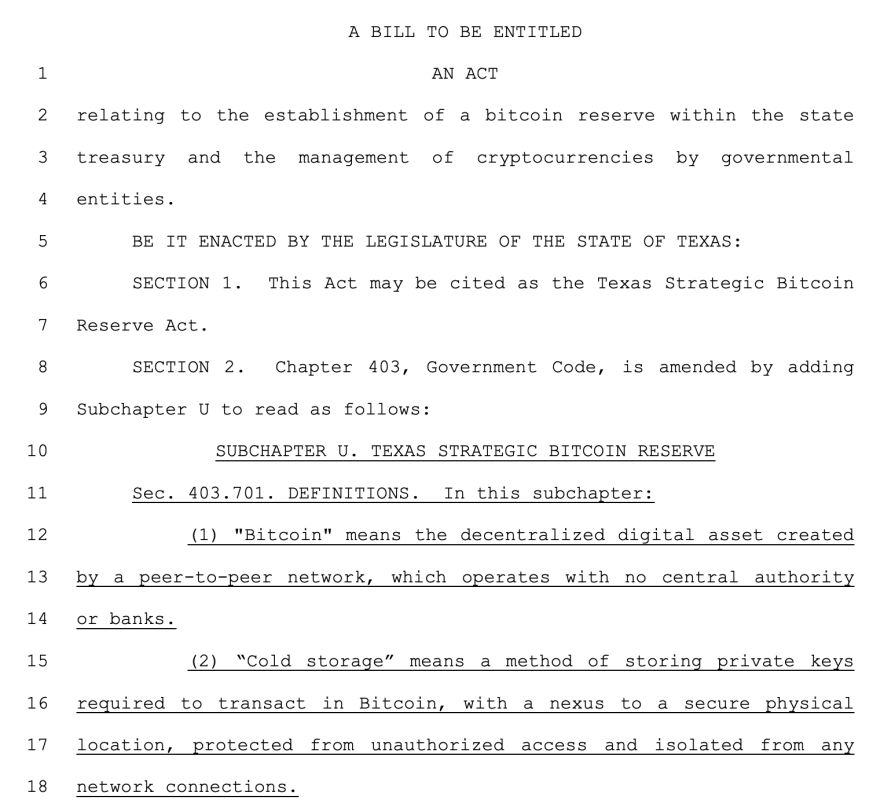legislation
Bill That Authorizes Texas Comptroller To Invest $250 Million Into Bitcoin Moves To Committee
Published
3 days agoon
By
admin
Today, H.B. 4258, which authorizes the state’s comptroller to invest up to $250 million in bitcoin has been referred to the state’s Delivery of Government Efficiency Committee, which is Texas’ version of the United States federal government’s DOGE.
The bill was originally introduced to the Texas House of Representatives on March 11, 2025, and was sponsored by two Democratic Congresspeople — Rep. Ron Reynolds and Mihaela Plesa.
Under the proposed legislation, Texas’ comptroller would have the power to invest funds (up to $250 million, as mentioned) from the state’s Economic Stabilization Fund — colloquially referred to as the state’s “Rainy Day Fund”, which was created to serve as a savings account for the state and to prevent sudden notable cuts to schools, health care, or other vital state services — into bitcoin and/or other cryptocurrencies.
It also authorizes municipalities or counties to invest up to $10 million of its funds or funds under its control into bitcoin and/or other cryptocurrencies.
If the bill were to become law, it would take effect on September 1, 2025, which would provide state- and local-level government officials time to formulate an investment strategy as well as devise a plan for custody.
According to Bitcoin Laws, H.B. 4258 is one of eight currently active bitcoin- or crypto-related bills that have been introduced to either the Texas Senator or the state’s House of Representatives. Of the eight bills, it’s the fifth to move to committee.
Four of these bills, including this current bill, would authorize the state to put bitcoin on its balance sheet in some fashion. The other three — H.B. 1598, Senate Bill (S.B.) 21 and S.B. 778 — all call for Texas to establish a Strategic Bitcoin Reserve (SBR).
These three SBR bills are all in committee, with S.B. 21 now in its second round of review by committee. The bill recently passed the state Senate with a 25-5 vote.
Texas remains the state with the second highest number of active bitcoin- and crypto-related bills, trailing behind only Arizona, which has nine active bills, three of which are close to being enacted into law.
The state continues to be one of the most Bitcoin-friendly states in the United States, as not only is it friendly to Bitcoin in a legislative sense, but it is currently home to approximately one-third of the U.S.’s total Bitcoin mining hash rate.
Source link
You may like


Toncoin Takes A Hit With 12% Correction After Failing To Break $4.34, More Pain?


Bitcoin sentiment falls to 2023 low, but ‘risk on’ environment may emerge to spark BTC price rally


Crypto Trader Says Dogecoin Is at a Critical ‘Make-or-Break’ Level, Updates Outlook on Solana and Avalanche


Bitcoin Covenants: CHECKSIGFROMSTACK (BIP 348)


Illinois State Senator’s Bill Seeks to Claw Back $163 Million Lost to Crypto Fraud


Here’s why Bitcoin, altcoins, and the stock market continued falling on Friday
Bitcoin Policy
Proposed Bipartisan Legislation Recognizes Bitcoin As A Technology That Supports Democracy
Published
1 week agoon
March 27, 2025By
admin
On Wednesday, the office of Rep. Gabe Amo issued a press release stating that Rep. Amo and Rep. Kim (R-CA) reintroduced a bipartisan resolution supporting the use of distributive ledger technologies (DLT), including blockchain, to “support democratic governance, human rights, freedom of information, transparency, and innovation around the world.”
The resolution (the full text of which was not linked to in the press release) urges federal agencies to explore and support DLT and expresses Congress’ commitment to advancing responsible innovation on this technological front.
Rep. Kim commented on the importance of this technology in the press release.
“U.S. leadership in emerging technologies like blockchain not only improves Americans’ lives but also helps us advance transparency in U.S. foreign assistance, human rights, and freedom across the globe,” said Rep. Kim.
“This legislation is vital, especially as we see the Chinese Communist Party exporting its surveillance technologies and authoritarianism abroad. I am proud to join Congressman Amo to lead this bipartisan resolution to ensure the United States shines as a beacon of hope, freedom, and innovation on the world stage,” she added.
The press release also cited how, in Screven County, Georgia, the Bitcoin blockchain was used to safeguard election election results and provide transparency to voters, linking to this article, which tells the story of the event.
Simple Proof, the company that helped Screven County officials commit its vote tallies to the immutable Bitcoin blockchain also recently helped Republicans in Williamson County, Tennessee do the same with the results of its Republican leadership vote.
Simple Proof put itself on the map when it helped to secure the results of the most recent presidential election in Guatemala, the story of which is told in the short documentary Immutable Democracy. Thanks to the vote tallies from the election being safeguarded on the Bitcoin blockchain, the integrity of the election was upheld, despite efforts made to tamper with physical votes once voting had concluded.
The work that the company has done both in the U.S. and abroad is a testament to a point Rep. Amo made in the press release.
“Innovative technology like blockchain helps promote transparency and strengthen democratic institutions around the world,” said the congressman.
While the press release provided evidence of the Bitcoin blockchain being used to preserve democratic values, it didn’t differentiate between Bitcoin and other blockchains, many of which, by design, are less secure.
Source link
bill
Kentucky Senate Passes Bill Protecting Bitcoin Self-Custody Rights
Published
3 weeks agoon
March 14, 2025By
admin
Yesterday evening, the Kentucky Senate unanimously passed a bill aimed at protecting Bitcoin self-custody rights and digital asset mining operations. With a decisive 37-0 vote, the legislation, titled AN ACT relating to blockchain digital assets (HB 701), now moves to the Governor’s desk for final approval.
NEW:
Kentucky Senate passes bill that will protect Bitcoin self custody rights with 0 votes against it.
The bill now heads to the Governors desk. pic.twitter.com/HPciWIgpZO
— Bitcoin Magazine (@BitcoinMagazine) March 14, 2025
Sponsored by Representatives Adam Bowling and T.J. Roberts, the bill affirms the right of individuals to self-custody digital assets through self-hosted wallets. Additionally, it prevents local zoning laws from discriminating against digital asset mining businesses, ensuring that Bitcoin miners can operate freely within the state.
The bill outlines several key provisions, including:
- Protection for Bitcoin self-custody: Individuals have the legal right to use and store digital assets in self-hosted wallets.
- Prohibition of discriminatory zoning laws: Local governments cannot impose zoning changes that unfairly target digital asset mining businesses.
- Exemptions from money transmitter licensing: Home Bitcoin miners and digital asset mining businesses are exempt from Kentucky’s money transmitter requirements.
- Clarification of securities laws: Digital asset mining and staking as a service are explicitly not classified as securities under Kentucky law.
@Rawlings4Ky is carrying HB 701 which protects the use of digital assets and self-hosted wallets, prevents local zoning discrimination against digital asset mining businesses, and establishes guidelines for blockchain node operations. It shields node operators and staking… pic.twitter.com/1crnd8mqQS
— KY Senate Majority (@KYSenateGOP) March 13, 2025
After passing through the Kentucky House with a 91-0 vote on February 28, 2025, the bill moved swiftly through the Senate. The March 13 vote saw full bipartisan support, with 37 senators voting in favor, zero opposed, and one not voting.
The legislation now awaits the Governor’s signature, which would officially enshrine Bitcoin self-custody protections and digital asset mining rights into Kentucky law. If signed, Kentucky will become one of the more Bitcoin-friendly states in the country, setting a precedent for other states to follow.
Source link
bill
Texas State Rep Files For Strategic Bitcoin Reserve
Published
4 months agoon
December 12, 2024By
admin

Today, Texas State Representative Giovanni Capriglione officially filed for a Strategic Bitcoin Reserve bill for the state of Texas during a 𝕏 spaces with Dennis Porter of Satoshi Action Fund, a Bitcoin advocacy organization working with politicians on pro-Bitcoin legislation.

To summarize, the bill would effectively:
- See Texas buy and hold bitcoin as a strategic reserve asset.
- Securely store the BTC in cold storage for at least five years.
- Allow Texas residents to donate bitcoin to the reserve.
- Ensure transparency via yearly reports and audits.
- Allow state agencies to accept cryptocurrencies, and convert them to bitcoin.
- Establish rules for security, donations, and management.
“This Act takes effect immediately if it receives a 12 vote of two-thirds of all the members elected to each house, as 13 provided by Section 39, Article III, Texas Constitution,” the legislation states. “If this Act 14 does not receive the vote necessary for immediate effect, this Act 15 takes effect September 1, 2025.”
This is yet another step towards America embracing Bitcoin, fueled by President-elect Donald Trump and Senator Cynthia Lummis’ lead by introducing a Strategic Bitcoin Reserve bill for the United States earlier this year. The hype around implementing a Strategic Bitcoin Reserve has caused a snowball effect of other states and countries introducing legislation to adopt one as well. Other states like Pennsylvania and countries like Russia and Brazil are among those introducing bills for a Strategic Bitcoin Reserve.
“Chairman Capriglione is the Chair of the Texas Pensions, Investments, and Financial Services Committee so this bill has legs!” commented Lee Bratcher, President of the Texas Blockchain Council. “No taxpayer funds will be spent on the bitcoin.”
Source link

Toncoin Takes A Hit With 12% Correction After Failing To Break $4.34, More Pain?

Bitcoin sentiment falls to 2023 low, but ‘risk on’ environment may emerge to spark BTC price rally

Crypto Trader Says Dogecoin Is at a Critical ‘Make-or-Break’ Level, Updates Outlook on Solana and Avalanche

Bitcoin Covenants: CHECKSIGFROMSTACK (BIP 348)

Illinois State Senator’s Bill Seeks to Claw Back $163 Million Lost to Crypto Fraud

Here’s why Bitcoin, altcoins, and the stock market continued falling on Friday

Bitcoin Falls Back to $83K, XRP, SOL, DOGE Surrender Gains as China Announces 34% Tariffs on All U.S. Goods

BTC Holds $84K, ATOM & FIL Become Top Gainers

Analysts Eye 20% Breakout If This Level Is Reclaimed

AI and blockchain — A match made in heaven

‘We’re Still in Danger Territory’: Crypto Analyst Unveils Bearish Setup for Bitcoin – Here Are His Targets

Bitcoin Startups Raised Nearly $1.2 Billion

Illinois to End Lawsuit Against Coinbase Over Staking Program: Report

Justin Sun takes legal action against FDUSD issuer
Not a Meme! DePIN Can Take Crypto Mainstream

Arthur Hayes, Murad’s Prediction For Meme Coins, AI & DeFi Coins For 2025

Expert Sees Bitcoin Dipping To $50K While Bullish Signs Persist

Aptos Leverages Chainlink To Enhance Scalability and Data Access

Bitcoin Could Rally to $80,000 on the Eve of US Elections

Sonic Now ‘Golden Standard’ of Layer-2s After Scaling Transactions to 16,000+ per Second, Says Andre Cronje

Institutional Investors Go All In on Crypto as 57% Plan to Boost Allocations as Bull Run Heats Up, Sygnum Survey Reveals

Crypto’s Big Trump Gamble Is Risky

Ripple-SEC Case Ends, But These 3 Rivals Could Jump 500x

Has The Bitcoin Price Already Peaked?

A16z-backed Espresso announces mainnet launch of core product

Xmas Altcoin Rally Insights by BNM Agent I

Blockchain groups challenge new broker reporting rule

The Future of Bitcoin: Scaling, Institutional Adoption, and Strategic Reserves with Rich Rines

Trump’s Coin Is About As Revolutionary As OneCoin

Is $200,000 a Realistic Bitcoin Price Target for This Cycle?
Trending

 24/7 Cryptocurrency News5 months ago
24/7 Cryptocurrency News5 months agoArthur Hayes, Murad’s Prediction For Meme Coins, AI & DeFi Coins For 2025

 Bitcoin3 months ago
Bitcoin3 months agoExpert Sees Bitcoin Dipping To $50K While Bullish Signs Persist

 24/7 Cryptocurrency News3 months ago
24/7 Cryptocurrency News3 months agoAptos Leverages Chainlink To Enhance Scalability and Data Access

 Bitcoin5 months ago
Bitcoin5 months agoBitcoin Could Rally to $80,000 on the Eve of US Elections

 Altcoins2 months ago
Altcoins2 months agoSonic Now ‘Golden Standard’ of Layer-2s After Scaling Transactions to 16,000+ per Second, Says Andre Cronje

 Bitcoin5 months ago
Bitcoin5 months agoInstitutional Investors Go All In on Crypto as 57% Plan to Boost Allocations as Bull Run Heats Up, Sygnum Survey Reveals

 Opinion5 months ago
Opinion5 months agoCrypto’s Big Trump Gamble Is Risky

 Price analysis5 months ago
Price analysis5 months agoRipple-SEC Case Ends, But These 3 Rivals Could Jump 500x


